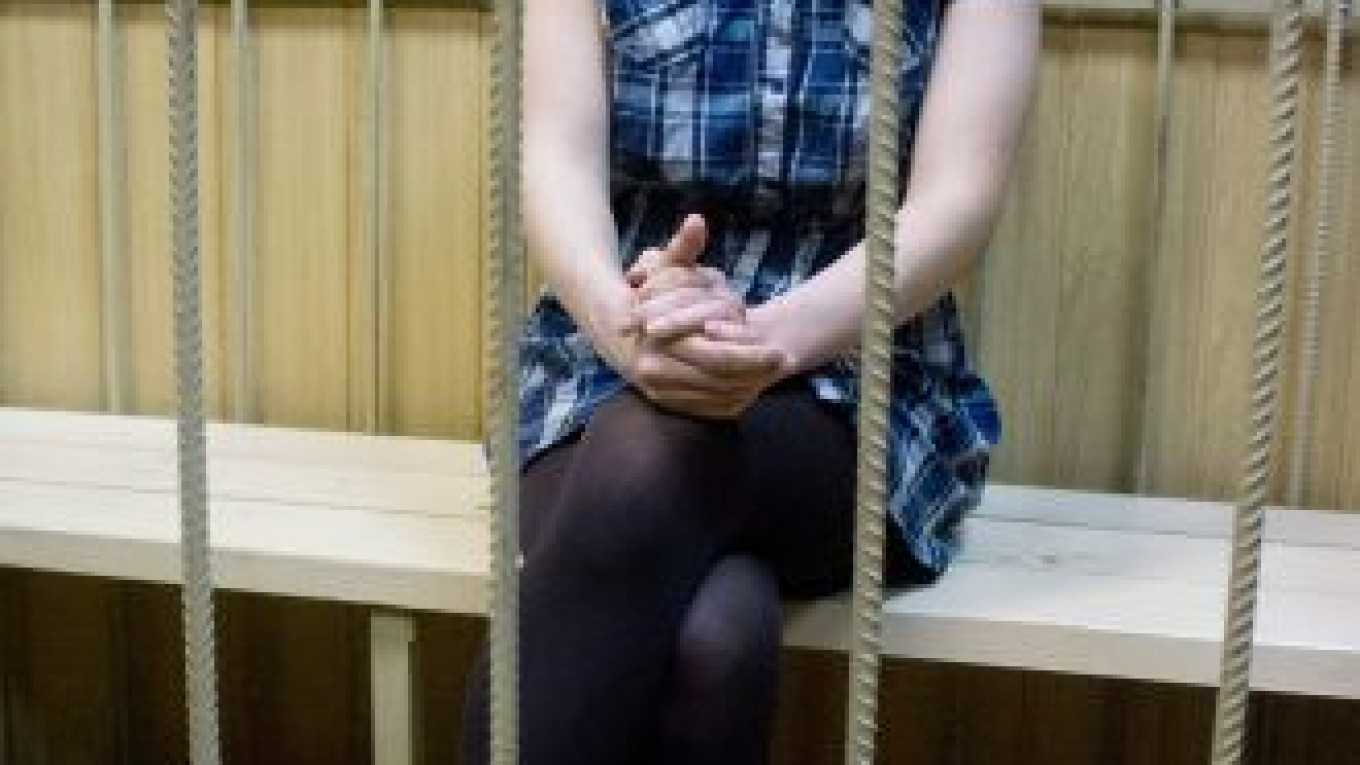Arguing that the Pussy Riot case has no political undertones, the state prosecutor said Tuesday that the trial was purely about religious hatred and asked the court to sentence the defendants to three years in prison.
A verdict could be announced as early as Wednesday, although there is a chance that the trial could be dragged out until next Monday, defense lawyers said.
Despite the prosecutor’s plea, the verdict and punishment rest in the judge’s hands, and the three defendants — Nadezha Tolokonnikova, 22; Maria Alyokhina, 24; and Yekaterina Samutsevich, 30 — could be jailed for up to seven years.
President Vladimir Putin told reporters in London last week that he hoped the punk rockers would not be punished “too harshly” over their February performance at Moscow’s Christ the Savior Cathedral.
The defendants have pleaded not guilty to felony charges of “hooliganism motivated by religious hatred and staged by an organized group.” Their lawyers have insisted that the defendants had only offended believers and that the charge should be reduced to offending believers, a misdemeanor.
The seventh day of the trial opened around noon in the Khamovnichesky District Court with Prosecutor Alexander Nikiforov dismissing any political motive for the performance. Nikiforov said Putin’s name was not mentioned in the church and the defendants’ had edited it into a video recording later “with the sole goal of avoiding responsibility” for their actions.
The defendants reacted by loudly whispering in indignant tones and making knocking noises from the enclosed cell where they were seated in the courtroom.
Only one video has surfaced of the performance; it was filmed a considerable distance from the singers, and their words are indistinct. A second video, which angered believers, was edited to include scenes of Pussy Riot performing in Christ the Savior Cathedral and in another Moscow church, Bogoyavlensky Cathedral, several days earlier. It includes the masked singers screaming, “Mother of God, cast Putin out!”
The defendants apologized to believers on the first day of the trial and said they had hoped to persuade church leaders not to meddle in politics.
Nikiforov laid out his case against the defendants, saying they had violated public order by interrupting “the normal functioning of the church” and inflicting “serious moral damage” on church workers who tried to stop their performance.
Hooliganism is defined in the Criminal Code as “a gross violation of public order, manifesting clear disrespect to society.”
Nikiforov said the performers had expressed their hatred toward believers by “violating the rules of church behavior,” including wearing “extremely inappropriate clothes” and “defiantly colorful dresses”; shouting obscenities; and resisting efforts to stop their performance.
He dismissed declarations by the defendants that they hadn’t known some church rules as a “mockery,” saying they had published online comments in advance of the performance that they would “deliver a punk prayer beside the altar because women are not allowed there.” He also said they had entered the church wearing “suitable clothes” and changed once they got inside the building; they had “pushed away” a church worker who tried to prevent them from mounting the solea, a place off-limits to the public; and they had ignored a church worker who had “begged them to leave the place.”
He said the defendants had acted as an organized group because their actions were premeditated, which was proved, in particular, by videos of the earlier performance at Bogoyavlensky Cathedral and a rehearsal in a utility room.
He noted that an expert opinion read out in court Monday had found that the defendants had acted out of religious hatred. The court refused to hear two other expert opinions — also ordered by investigators — that had found otherwise.
Nikiforov said the band’s performance presented a public danger because it “showed the decay of public morals,” which he added must not be allowed because it previously led to the “near death” of the Orthodox faith.
“Given the public danger and the fact that this is a grave crime, the defendants can mend their ways only if they are isolated from society,” Nikiforov said, adding that the prosecution was asking for three years instead of the maximum seven because two defendants had young children and none had prior convictions.
His request for three years was backed by three lawyers representing church workers, who are listed in the case as the injured party, and the sole church worker who showed up in court Tuesday.
The defense lawyers tore into the prosecutor’s arguments in their closing speeches.
“What is the state prosecution charging the defendants with? That they wore clothes of an unsuitable color, that they prayed in the wrong way, and that they moved in an incorrect way?” lawyer Violetta Volkova said.
“In which law did they find the notions of blasphemy and sacrilege?” she said, staring intently at the prosecutor, who sat visibly red-faced, looking down at his papers.
“These women are not here for dancing in church but for their political beliefs,” Volkova said.
She also reiterated defense lawyers’ earlier arguments that the case and trial against the defendants have been carried out with multiple violations.
Another defense lawyer, Mark Feigin, said the church performance was a misdemeanor that even fell short of hooliganism because it had only violated other people’s constitutional right for freedom of conscience and religious belief.
To qualify as hooliganism, an action must present a public danger at any location, but the defendants would not have been prosecuted if they had performed on the Arbat, where various bands often perform, Feigin said.
Feigin also denied that the defendants had resisted church workers, saying video recordings in the case showed otherwise.
“There is a political order: to imprison them,” Feigin said, looking steadfastly at the judge, Marina Syrova, throughout his entire speech. “They must be acquitted.”
A court marshal listened interestedly, his eyebrows lowered, as Feigin spoke. When the lawyer finished, applause erupted from about half of the 60 reporters, supporters and relatives crowded into the courtroom.
“We all understand that all of this is not about a single legal violation,” the third defense lawyer, Nikolai Polozov, said, gazing at the courtroom audience during his speech. “The authorities have decided that they must not go out onto the street. It is better to keep repeating what a sacrilege they committed on all the state television channels than to solve the real problems that are piling up in the government,” he said.
The audience applauded him, too.
A Message from The Moscow Times:
Dear readers,
We are facing unprecedented challenges. Russia's Prosecutor General's Office has designated The Moscow Times as an "undesirable" organization, criminalizing our work and putting our staff at risk of prosecution. This follows our earlier unjust labeling as a "foreign agent."
These actions are direct attempts to silence independent journalism in Russia. The authorities claim our work "discredits the decisions of the Russian leadership." We see things differently: we strive to provide accurate, unbiased reporting on Russia.
We, the journalists of The Moscow Times, refuse to be silenced. But to continue our work, we need your help.
Your support, no matter how small, makes a world of difference. If you can, please support us monthly starting from just $2. It's quick to set up, and every contribution makes a significant impact.
By supporting The Moscow Times, you're defending open, independent journalism in the face of repression. Thank you for standing with us.
Remind me later.






